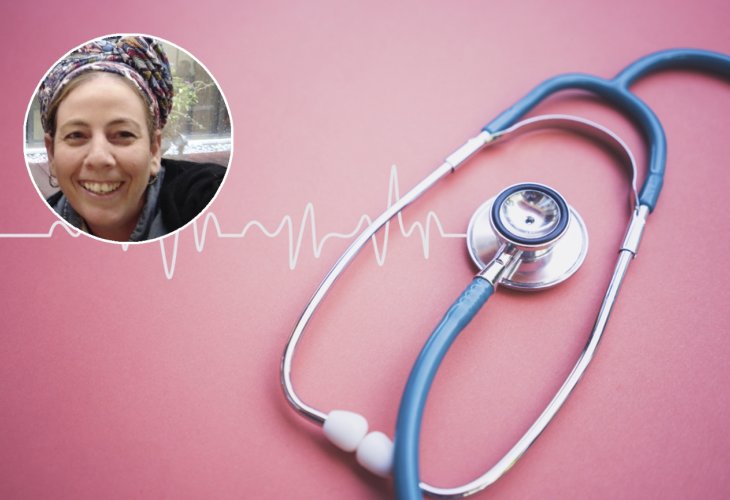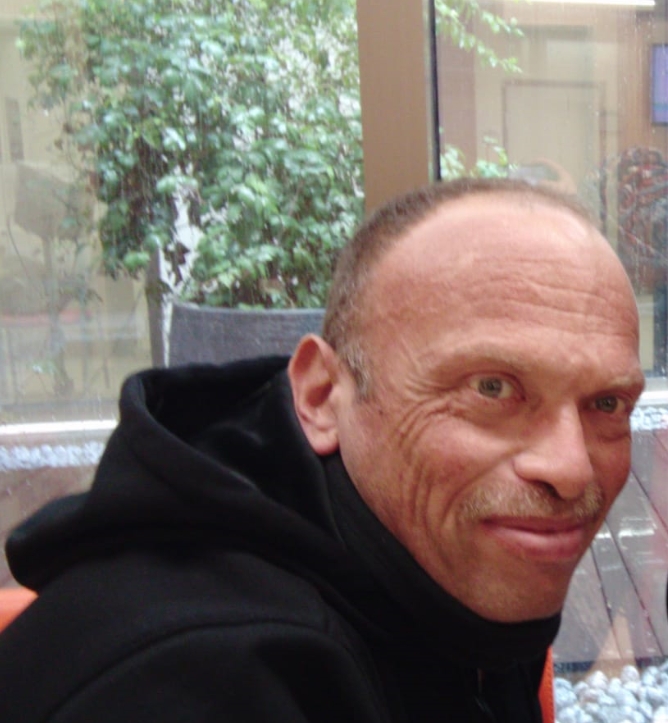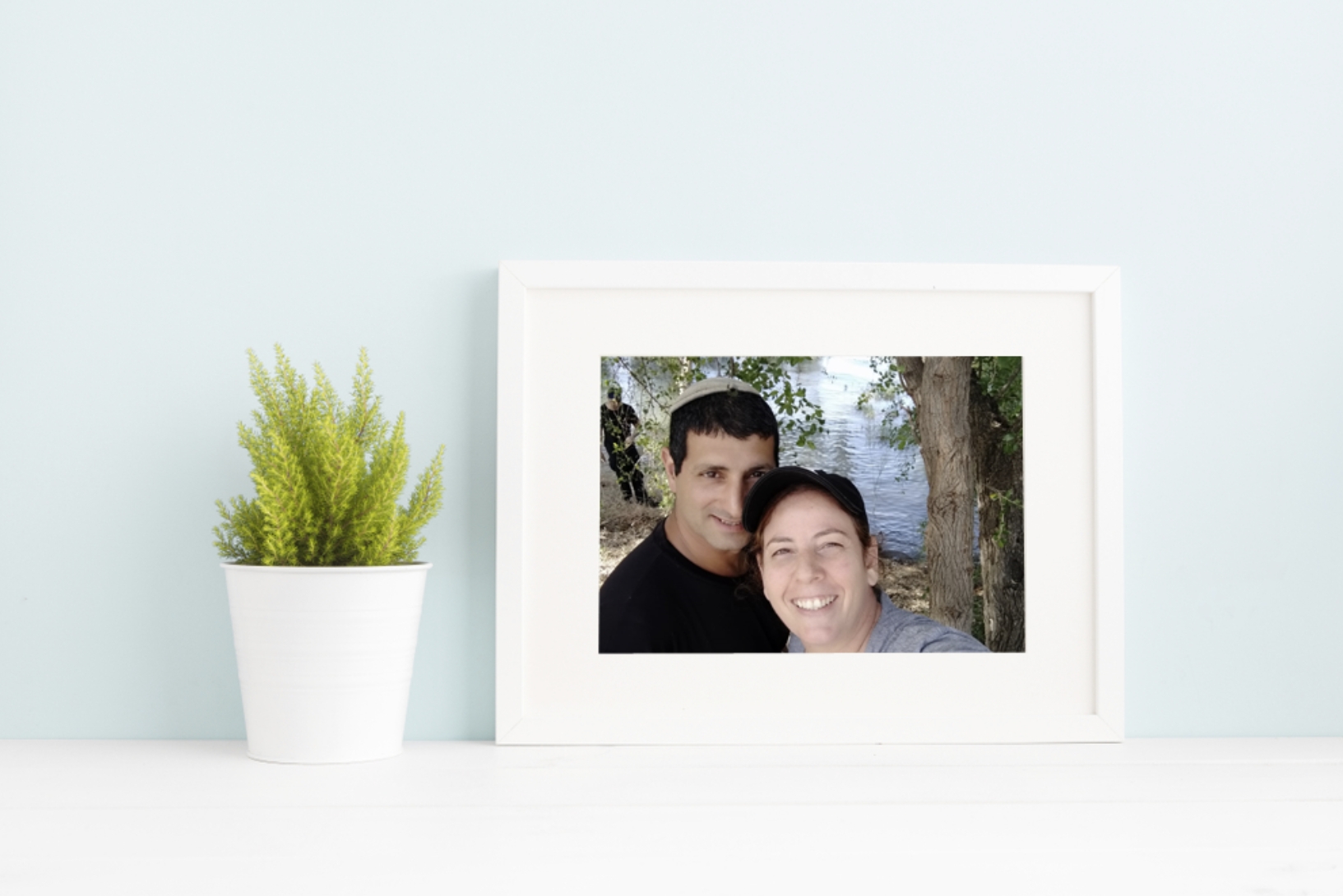Tal Taieri, Oncology Nurse: "Suddenly You See How People Begin to Live"
She is familiar with the fragility of life and chose to be part of giving life. Tal, the last donor through Rabbi Heber z"l, shares her story on donation, work, and life lessons. Read to (not) believe there are still people of a different kind.
 (In the circle: Tal Taieri)
(In the circle: Tal Taieri)Tal Taieri worked as a kindergarten teacher, but felt she had more to give to humanity. On the advice of her manager, she retrained as a nurse, and eight years ago, she started working in the oncology department at Schneider Children's Medical Center in Petah Tikva. "Unfortunately, in the oncology department, the news isn’t always good. I have to cope with difficult farewells and the loss of lives of children I’ve grown attached to. Something inside me burned, and I decided to give life to others, not just witness lives being lost."
Taieri (42), a mother of three, lives happily with her husband Avichai in the settlement of Alfei Menashe in Samaria. Two years ago, both Tal and Avichai donated a kidney.
Where does the idea to donate a kidney enter your lives?
"We have people in our family who serve as role models. My aunt, Malka Huber, 64, and my sister, Irit Birenbaum, both donated a kidney to kidney patients," Tal replies. Avichai adds, "I think witnessing them undergo the donation successfully without any issue is inspiring, maybe even a bit enviable." Tal continues, "We were always raised with love for others and love for Israel. We heard that lives could be saved by donating a kidney, and I wanted to be part of that."
Tal emphasizes that she works in pediatric oncology: "It’s not easy for me to see the struggles kids face for their lives. The work here is done with all my heart, and I get attached to the children, and if, heaven forbid, disaster strikes, it impacts me. That is why I decided I want to give life too, and kidney donation is giving life in the most literal sense. You suddenly see how people begin to live."
Were you not afraid of the process?
"Basically, a human body can manage with one kidney," Tal answers me. When I question if one kidney is sufficient, then why did Hashem create us with two kidneys? Tal responds with an answer that amazed me: "You ask a good question, but the answer I believe is that Hashem created two kidneys so we could donate one to others, saving their lives." I was impressed. "As for fear," Tal adds, "of course there are concerns, and the process is long and complex, but realizing that someone’s life depends on my kidney, knowing that without my kidney a young person might die—it puts everything in the right perspective."
Avichai was deeply moved after accompanying a friend who donated a kidney: "I stayed close to him on the donation day and the night after the surgery. Throughout that night, I couldn’t sleep. I saw the family that received the donation and heard their conversations. That night I made my decision, and from my friend’s bedside, I sent the first email to the Matnat Chaim organization led by Rabbi Heber z"l."
The recipient paired with Avichai was not young nor healthy, in his 60s, after years of dialysis. "I remember how he looked when we first met," Avichai says, "It was after his last dialysis. I saw a tired man with yellowed skin, obviously very ill. But when we met two days after the donation, he looked completely different—suddenly a living man with color and joy. I witnessed before my eyes what giving life means."
 The recipient (Photo: Private Album)
The recipient (Photo: Private Album)Sadly, the recipient passed away a year and two months after the donation, unrelated to kidney disease, but due to pancreatic cancer. "Tal is an oncologist," Avichai notes. "Ever since she heard about his cancer, she advised me to say goodbye to him, but I am an optimist and wasn’t able to think about that. I even visited him a week before his passing."
"My recipient didn’t enjoy the donation for long, but he had a year and two months of happiness. At the funeral, his daughter approached me and said excitedly, 'You gave my father joyful life; he was very happy, we traveled and spent time together, he was simply happy.' That gave me immense satisfaction."
Despite the recipient’s death, Avichai never regrets
"It’s important to mention," Avichai adds, "that after the recipient died, some people felt they needed to console me, as if the donation had failed and all my efforts were in vain. But I don’t see it that way at all. Of course, his passing was very difficult because I connected with the family, and it hurt that they made such efforts and then lost their father to something else. But I never felt as if my donation was wasted, and I certainly don’t regret it. I know I did my part, and Hashem did His. The fact that the recipient died a year and two months later doesn’t detract from the importance of the donation I made, especially for Jews who believe in cherishing every moment of life."
 (Photo: Private Album)
(Photo: Private Album)Tal tells: "On the day I went to the hospital to discharge Avichai, we said goodbye to the recipient, and by chance, we met his sister sitting by his side. The recipient rose from the bed and told us that recently his sister was diagnosed with the same hereditary kidney disease he suffered from. He told us: 'Now you need to donate to her too.' At that moment, without flinching, I told her: 'I’m yours.'"
"It came to me so naturally and clearly. Of course, I didn’t start tests right away. I waited for Avichai to recover, but about two months later, I sent in the forms. Unlike Avichai, my process was a bit longer. Early on, I was told I couldn’t donate to the recipient’s sister because we weren’t a match, but I was asked if I wanted to proceed to donate to someone else. Of course, I said yes, and I stated I had no preference for anyone. Any Jew in need, I am there for them."
From the day the tests began, about a year passed until the donation day came. "In Matnat Chaim, they tried to match me with another person but without success, then they tried someone else who didn’t match either. Time went by until they matched me with my recipient, a relatively young person, 46 years old, a father of two. I must admit that when I first met him on committee day, I saw him with a cigarette in hand, which bothered me. He later told me that after seeing the light in my eyes, he couldn’t bring himself to touch cigarettes again, and that was his last cigarette."
Tal describes a story of providence and closure: "The surgery was scheduled for Tuesday, and I asked for it to be moved to Sunday because I had classes on Tuesdays, and I didn’t want to miss them. The hospital allowed it easily. Only on Friday, when I was supposed to be discharged, I was told that at that same time, the sister of my husband’s recipient was going into surgery. Her name is Mally, and it was after her brother passed away. It turned out she was to have surgery on Sunday, but when she heard I asked to move it forward, she switched with me. In the end, we were both hospitalized. Even though I didn’t donate to her, I felt it was the closing of a circle."
Was your recipient someone you knew?
"No. Not at all. I didn’t know him. He was a young man, 46 years old, who had kidney damage due to high blood pressure. Today, after the transplant, he’s back to leading a normal and healthy lifestyle, going to work and returning home to his family. He received a new life as a gift." When Tal says "new life," she wants to emphasize an important point. "Don’t think the donation process is simple. For two years, I underwent dozens of compatibility tests and various procedures before deciding to whom and what I would donate, all while receiving raised eyebrows from the oncology staff with whom I work. Plus, anesthesia isn’t simple. People tend to underestimate anesthesia, but as a nurse, I know how much thought goes into every anesthesia performed, especially with children, and even more so with adults. But when I know that at the end of the process, there’s a person who receives their life as a gift, all hardships become insignificant compared to the joy of giving life. It atones for everything."
As is well known, the person coordinating and mediating between donors and recipients is Matnat Chaim, which was led until recently by Rabbi Avraham Yeshayahu Heber z"l, who recently passed away from coronavirus. Today, his wife Rachel proudly continues her husband's holy work.
The Last Transplant of Rabbi Heber z"l
Did Rabbi Avraham Yeshayahu Heber accompany you through the entire process?
"Rabbi Heber walked with us every step of the way from the start, calming our fears and doubts," says Tal. "To my knowledge, I was the last donor before the coronavirus, the last donor Rabbi Heber z"l accompanied on the way to a patient who was about to receive a new life."
The interaction with life is an integral part of Tal’s work in the pediatric oncology department. "It’s a mistake to think being an oncology nurse is just a job. Anyone who comes with that approach will quickly find themselves out. An oncology nurse must come from a place of mission, to wrap parents and children who are fighting battles that even those larger than them couldn’t withstand, providing hope, a kind word, a smile. That’s my work, which is essentially my mission," says Tal.
"When you’re in oncology, you see how miracles happen tangibly," Tal shares one of many miracles. "A four-year-old girl with a huge tumor in her belly came to our department. She simply had an enormously large belly that’s hard to describe. It was clear to us as a team that this child wouldn’t survive the disease. But by the grace of Hashem, after difficult treatments, surgeries, and radiation—the child recovered. It was a great miracle."
"But it’s not enough to experience a miracle," Tal adds, "You also have to recognize it." When I try to understand her intentions, she explains: "On another occasion after the child recovered, I went with them on a trip as an accompanying nurse. I remember throughout the trip, the relations between the child and her mother were very bad. The child was very rude to her mother, causing her mom to cry. I turned to her mother and said, 'Say thank you that these are your tears, and not because you don’t have your daughter.' As the nurse who treated her, I knew the state of the child and how close she came to a deep sorrow. That was my proof that the recipient of a miracle doesn’t recognize their miracle."
How can you really survive the hardships that sometimes occur in your department?
"Hashem created a repression mechanism. Just like parents manage to survive such a long and challenging period, with all the difficulties, so does the medical team. It’s the mechanism Hashem created. It doesn’t mean it’s not difficult, but as Jews, we believe we came here to strive and do even the hard things. That’s my daily work. Sometimes I arrive from home in not the best mood, but upon entering the department, I doNEXT and forget everything."
"Overall, things from the inside don’t appear like they do from the outside. Those within understand it’s the happiest and most optimistic department. There are many successes here, and the difficult moments are few compared to disappointments," Tal emphasizes.
In conclusion, Tal shares something personal: "Baruch Hashem, we have three children. The gaps between them are significant because we had to make great efforts to bring them into the world. But we don’t really have only three children. As I told Rabbi Heber, we have five children. Three born to us, and two we gave life to. Even though one of them is gone, until he passed, we gave him life, and every Jew knows every moment of life is an entire world."
What drives an ordinary person to establish a revolutionary life-saving organization? An inspiring interview with Rabbi Yeshayahu Heber:
Chilling: These are the last words of Rabbi Yeshayahu Heber z"l

